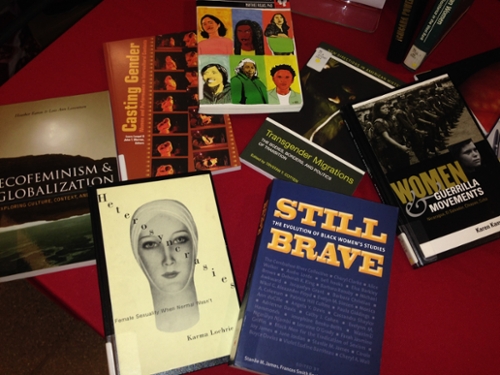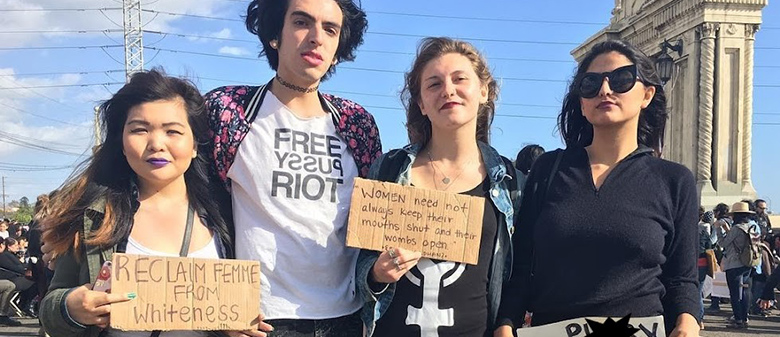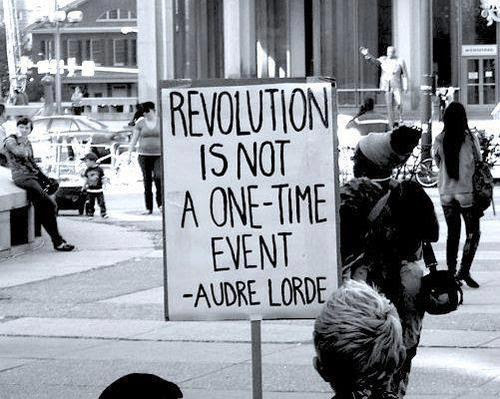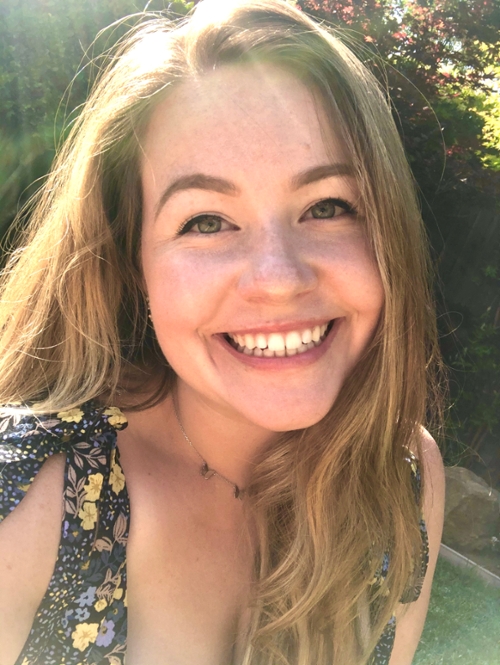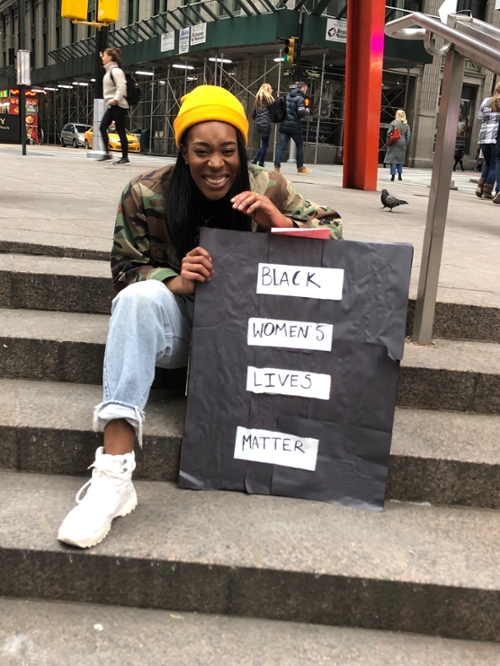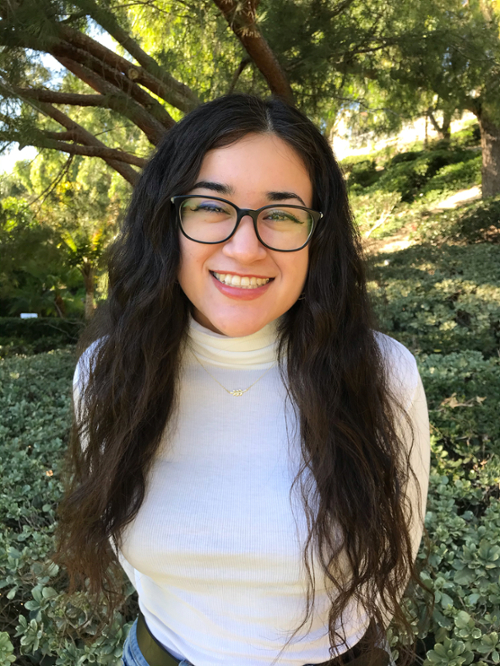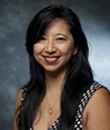“If one link of the chain be broken, the chain is broken. A bridge is no stronger than
its weakest part, and a cause is not worthier than its weakest element. Least of all
can woman’s cause afford to decry the weak. We want, then, as toilers for the universal
triumph of justice and human rights, to go to our homes from this Congress, demanding
an entrance not through a gateway for ourselves, our race, our sex, or our sect, but
a grand highway for humanity. The colored woman feels that woman’s cause is one and
universal; and that not till the image of God, whether in parian or ebony, is sacred
and inviolable; not till race, color, sex, and condition are seen as the accidents,
and not the substance of life; not till the universal title of humanity to life, liberty,
and the pursuit of happiness is conceded to be inalienable to all; not till then is
woman’s lesson taught and woman’s cause won—not the white woman’s, nor the black woman’s,
not the red woman’s, but the cause of every man and of every woman who has writhed
silently under a mighty wrong. Woman’s wrongs are thus indissolubly linked with undefended
woe, and the acquirement of her ‘rights’ will mean the final triumph of all right
over might, the supremacy of the moral forces of reason, and justice, and love in
the government of the nations of earth.”(2)
-- Anna Julia Cooper, Speech delivered at the World’s Congress of Representative
Women in Chicago, May 1898.[1]
Thoughts on a Century of the 19th Amendment
The centennial of the ratification of women’s suffrage in this year of 2020 offers
us a valuable learning opportunity. From a deeper understanding of the 19th Amendment—its
passage, context, and consequences— we can gain insight into the complexities of socio-political
struggle and the relevancy of its lessons to today’s.
On the one hand, commemoration of the hard-won passage of the 19th Amendment in 1920
is indeed a moment for celebration. It constituted truly historic legislation—a progressive
measure that moved the needle towards greater fulfillment of democratic ideals and
“a more perfect union” by sanctifying de jure voting rights for all adult U.S. citizens,
not just male ones.[2] It is important and right to pay homage to the diverse, courageous
suffragists whose blood, sweat and tears watered the way over many generations (such
as Susan B. Anthony, Elizabeth Cady Stanton, Sojourner Truth, Ida. B. Wells, Anna
Julia Cooper, Lucy Stone, Alice Paul, and countless others). We should be grateful
to the legions of activists who labored to amend the constitution so women today can
vote.
On the other hand, reducing the centennial remembrance of women’s suffrage to that
of mere celebration would be a lost opportunity of grand proportions; its pedagogical
value is far greater and more useful than this. The 19th Amendment is an example
that can teach us how racial and gendered politics in the United States have long-been
intertwined— problematically abstracted and pitted against the other-- in ways central
to the success and failure of some of our most prominent legislative decisions with
long-lasting implications for people’s lives.
Ratification of the 19th Amendment in 1920 did not usher in enfranchisement of African-American
women (nor other women of color) over the next 100 years. Grandfather clauses, literacy
tests, poll-taxes, violence, terrorism, and other suppression techniques prevented
African American men and women from voting until the Voting Rights Act was instituted
in 1965. (Thank you, Martin Luther King, Jr. & Fannie Lou Hamer!)
The Women’s Suffrage Movement (~1848-1920) was not a unified front, but rather was
dramatically splintered along racial ideologies and divergent ideas about tactics
and priorities. The National Women’s Suffrage Association and the American Women’s
Suffrage Association, both established in 1869, were two of the most prominent. The
more conservative, racially divisive NWSA contrasted with the more progressive, racially-inclusive
stance of the AWSA. These rivaling groups did not reconcile until 1890 when they consolidated
as NAWSA. Other important factions included: the National Association of Colored
Women [NACW], led by black female reformers such as Mary Church Terrell since its
founding in 1896, which prioritized disenfranchisement, as well as lynching, segregation
and poverty; and the National Women’s Party led by Alice Paul who broke from NWSA
to form the more militant and racially-diverse NWP in 1916.
It’s necessary to go back further though: let’s recall that after the abolition of
slavery in 1865 with the 13th Amendment, the crafting and passage of the 14th and
15th Amendments involved heated disagreements that fissured along race and gender
politics. Indisputably, many (male) abolitionists and voting rights activists were
virulently sexist and many (white, female) suffragists were virulently racist—these
facts are central to understanding how things played out. Moreover, while many suffragists
were some of the most prominent leaders in the abolitionist movement and the fight
for universal voting rights, the introduction of gender into the language of the 14th
Amendment (specifying citizenship rights to “males” for the first time) and the explicit
exclusion of women as part of the 15th Amendment compelled many suffragists (e.g.,
NWSA) to withdraw their support for proposed legislation that would make it illegal
to the deny the vote to citizens “on the basis of race, color or former conditions
of servitude” if it did not include “on the basis of sex” as well. Women suffragists
were told: “One issue at a time!” “Be patient, Ladies!” Moreover, despite its generic
name, the so-dubbed “Negro’s Hour” did not acknowledge that black people can also
be women.[3] While the 15th Amendment enfranchised black men, it simultaneously hypostasized
into law the disenfranchisement of women. The specific crafting of the 15th Amendment
made the 19th Amendment necessary. It would take more than fifty years to pass when,
in 1920, voting finally become legal for women (of any color) to vote in the United
States. However, as previously outlined, it would take forty more years after this
for the de facto enfranchisement of black women as made possible by federal legislation
(i.e., the 1965 Voting Rights Act).
There are many reasons why it’s important to remember this now. Attainment of universal
voting rights in the United States is an on-going struggle, as evidenced by the recent
gutting of key provisions of the 1965 Voting Rights Act and the myriad techniques
used by states to suppress black and other minority voting in the present day. In
part, it is also the enduring legacy of past “wins” whose partiality and failures
have engendered the disenfranchisement and other injustices of the present.[4] Moreover,
it is the continued use of tried-and-true techniques to sow divisiveness and maintain
the status quo. Nationalistic appeals to group fears and allegiances, such as those
fueled by racism, misogyny, and xenophobia, to name a few, are as resilient and successful
as ever.
The Centennial provides occasion for us to examine the 19th Amendment in a larger
arc of history, the complex ways race, class, and gender intersect, and to better
recognize the implications that its passage and legacy hold for us today. We are
reminded to avoid seeing landmark legislation— in 1865, 1868, 1870, 1920, 1965[5]—
through rose-colored glasses. While commonly heralded as triumphant victories for
American equality and justice, ALL OF THESE legislated both the inclusion of rights
for some and the exclusion of rights for others. Through racism or misogyny (or both),
as well as xenophobia, heterosexism, classism, and other means, policies and laws
are crafted in ways that simultaneously enfranchise and disenfranchise.
The pitting of white/non-white and men/women against each other relies upon categories
that don’t compute, rendering many of us non-existent and others of us as the only
existences that matter. Sex and race continue to be played against each other in
an illogical assertion of singular, mutually-exclusive categories of existence, that
which are literally impossible in human fact (One can’t stop being black and just
be a woman; One can’t stop being a man and just be white; etc.). This point is illuminated
by The Combahee River Collective Statement (1977) and This Bridge Called My Back (1983):
[whose] writers refused to make such ‘forced’ choices. A solution to the problem of
singular subjectivity requires a group single-mindedly to organize itself around one
dimension of identity in order to act. Such organizing requires members of the group
who also identify on other dimensions to defer action against the other forms of oppression
they experience. They are, in effect, forced by such a strategy to choose which oppression
is "worse" than another, a situation likely to lead to resentment and to what Audre
Lorde has called "horizontal hostility"; that is, hostility toward one another among
variously defined oppressed groups (Fowlkes, 107). [6]
Outside of the scholarly world, we are often encouraged to simplify to the point of
distorting truth. The Centennial of the 19th Amendment provides occasion to remember
the complexity and partiality of historical triumphs, how its lessons can be used
to inform present struggles, and to recognize that “justice deferred is justice denied”[7]
and the mechanisms behind it.
For me, reflecting upon one hundred years of the 19th Amendment culminates in a scream
for feminist coalition politics.[8] Perhaps most associated with the radical black
feminist group The Combahee River Collective that developed it, the meaning of feminist
coalition politics is perhaps also best left to them:
Since 1974, (…) we have been involved in the process of defining and clarifying our
politics, while at the same time doing political work within our own group and in
coalition with other progressive organizations and movements. The most general statement
of our politics at the present time would be that we are actively committed to struggling
against racial, sexual, heterosexual, and class oppression, and see as our particular
task the development of integrated analysis and practice based upon the fact that
the major systems of oppression are interlocking. [9]
In the not-so-distant past, some Americans stopped viewing voting as particularly
important or consequential.[10] But in 2020, one would be hard-pressed to make a
credible case for this view as we head into one of the most consequential elections
in U.S. history.
We should take a page from the history of the Women’s Suffrage Movement to remind
us of the importance of: exercising your right to vote; the securing of universal
voting rights; the need for intersectional, intersubjective coalition-building to
effect any real change for social justice; and of paying attention to the complex,
intertwined politics of race and gender (as well as class and sexuality, etc.) that
can muddy the way.
---CK Magliola, Women’s Studies Instructor and Program Director
Read Celebrating a Historic Milestone in the Voice of Wilkinson!
- [1] Source: https://suffragistmemorial.org/anna-julia-haywood-cooper-august-10-1858-february-27-1964/
- [2] Not really all: In the language of the Constitution, voting rights only extend to
“eligible” adult citizens. Various groups have been denied the right to vote after
1920 (on the basis of race and national origin) and some continue to be (based on
incarceration or former-incarceration). For example, people of Asian ancestry, such
as Chinese, Japanese, other East Asian and South Asian groups were not allowed to
vote until 1952. Native Americans weren’t enfranchised until 1947. Voting rights for
many Mexican-Americans and other Spanish-speaking Latinx-Americans were not fully
protected until the extension of the Voting Rights Act in 1975 which radically mitigated
discriminatory practices against so-called “language minorities.” Residents of colonized
American territories (e.g., Puerto Rico, Guam, US Virgin Islands, American Samoa),
while American citizens, still cannot vote in the presidential elections.
- [3] To learn more on this, see the luminous black feminist anthology: Hull, Gloria T., Scott, Patricia Bell, and Smith, Barbara, eds., All the Women Are White, All the Blacks Are Men, But Some of Us Are Brave (Old Westbury, N.Y.: The Feminist Press, 1981). Within its pages, legal scholar Kimberlé Crenshaw identifies the “problematic consequence of the tendency to treat race and gender as mutually
exclusive categories of experience and analysis” (“Demarginalizing the Intersection
of Race and Sex,” 139).
- [4] For example, the 13th Amendment abolished slavery “except as a punishment for crime whereof the party shall
have been duly convicted” and the 14th Amendment protected voting rights to men “except for participation in rebellion,
or other crime.” These constitutional loopholes provided the groundwork for a system
of mass incarceration that has served to disproportionately disempower and disenfranchise
black people until the present day. According to a 2018 Report by The Sentencing
Project , 6.1 million Americans cannot vote, 40% of whom are African-American. To
learn more on this issue, see Michelle Alexander’s The New Jim Crow: Mass Incarceration in the Age of Colorblindness. (New York: The New Press, 2010).
- [5] 13th, 14th, 15th, 19th Amendments; Voting Rights Act.
- [6] Fowlkes, Diane L. “Moving from Feminist Identity Politics to Coalition Politics through a Feminist Materialist
Standpoint of Intersubjectivity in Gloria Anzaldúa's Borderlands/La Frontera: The
New Mestiza.” Hypatia , Spring, 1997, Vol. 12, No. 2, pp. 105-124. To read the full article, go to: https://www-jstor-org.libproxy.chapman.edu/stable/pdf/3810472.pdf
- [7] Quoted by Martin Luther King, Jr. in his “Letter from Birmingham Jail” (April 1963).
Stanford, CA: The Martin Luther King, Jr. Research and Education Institute. Retrieved
8/13/2020. http://okra.stanford.edu/transcription/document_images/undecided/630416-019.pdf
- [8]Black Lives Matter is an exemplar of activism organized by feminist coalition politics.
- [9] Fowlkes summarizes the CRC position as one defined by “their desire to engage on
their own terms with Black men and white women in what they believed should be linked struggles against racism and white
skin privilege, along with heterosexism, male privilege, and capitalist class structure.
By socially reconstructing their oppressions as simultaneous and related to others'
simultaneous oppressions and privileges, they showed the necessity of working in coalition
against complex systems of oppression and privilege” (1997: 106). To learn more about
the Combahee River Collective and to read the “Combahee River Collective Statement”, visit: https://combaheerivercollective.weebly.com/
- [10] …perhaps having grown disillusioned by the narrow choices of a 2-party system whose
opposing candidates hardly seemed that different, the electoral college system, and
the absence of any felt improvement in their own lives, etc.
